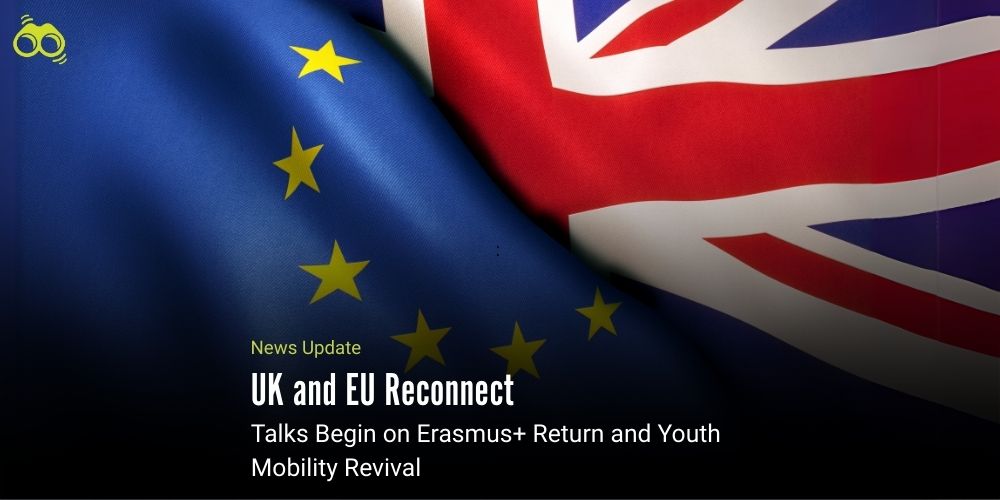A ‘Balanced’ Future for UK-EU Students? Starmer’s Government Eyes Erasmus+ Return Under New Terms
From Brexit Regret to Educational Renewal: UK Moves Closer to Rejoining Erasmus+
The United Kingdom and the European Union are taking steps to revitalise youth mobility opportunities, a move that could significantly impact student exchange and educational collaboration. Reports indicate that negotiations have begun to re-establish a youth mobility scheme between the two parties, potentially paving the way for the UK to rejoin the Erasmus+ programme. Although any future involvement may come with revised terms or alternative arrangements, these discussions signal a renewed focus on fostering academic and cultural exchange between UK and EU students.
Analysts have noted that shifts in international education often mirror broader geopolitical trends. In this case, the UK-EU negotiations form part of a wider effort to reset relations strained by Brexit. Furthermore, observers highlight global instability, particularly disruptions under the Trump administration, as a factor prompting both sides to seek new political and economic alignments. The recent UK-EU agreement on a security and defence pact, alongside measures to ease trade and travel, provides further evidence of improving ties.
The proposed educational mobility agreement is reportedly being called a “balanced youth experience scheme,” reflecting the UK’s intention to manage the number of incoming European students to minimise disruption to universities. Before Brexit, UK institutions were perceived by some as disadvantaged by mobility trends, as many EU students paid “home fees” that often failed to cover the full cost of their education. Conversely, relatively few UK students studied in Europe, a gap partly attributed to limited interest in learning foreign languages.
Moreover, observers note that no public statement has yet been made regarding the tuition fees European students might face under the new scheme. This issue is considered sensitive, with the UK university sector reportedly concerned about the financial implications and the potential impact on places available for domestic students. The UK government is negotiating with the EU to establish a time-limited youth experience scheme for cultural exchange, enabling young people to travel, work, and study abroad. Any agreement will be mutually agreed upon and include participant limits acceptable to both sides. The scheme will align with existing UK mobility rules, excluding access to benefits or the right to bring dependents. Additionally, the government is seeking association with Erasmus+ on significantly improved financial terms, which would offer broad opportunities across education, training, youth, and sport sectors.
Prime Minister Keir Starmer faces a challenge in reconciling public opinion with EU negotiations. Polls indicate that most Britons now regret Brexit, with only 30% supporting the decision, falling to 10% among 18- to 24-year-olds. While 64% favour closer ties with the EU short of full membership, only 55% support rejoining, reflecting significant public divisions.
Consequently, Prime Minister Starmer has prioritised partnerships over rejoining the EU, urging a shift from political debates to practical solutions that benefit the British public. He has expressed readiness to collaborate internationally if it improves life at home. Describing the recent trade and defence agreement as part of the UK’s outward strategy, he emphasised building selective relationships and securing deals in the national interest, reflecting the stance of an independent sovereign nation. The ongoing negotiations on youth mobility between the UK and the EU illustrate a cautious but hopeful step towards renewed collaboration amid complex political and public dynamics.
Editor's Note:
Post-Brexit, renewed discussions between the UK and the EU regarding youth mobility signal a key point in their evolving relationship. This initial move to re-establish academic and cultural exchange shows a practical acknowledgement of the advantages of such cooperation for students and the wider educational and economic sectors. The proposed "balanced youth experience scheme" indicates a deliberate effort to learn from previous issues and adjust to current circumstances, notably the financial strains on UK universities and shifting preferences for international study among young people in the UK. Negotiations regarding UK-EU relations are complex due to divided public opinion and political sensitivities, necessitating careful policymaking. Prime Minister Starmer's focus on practical partnerships over full EU reintegration reflects the government's cautious stance. Successful progress hinges on cooperation and flexibility, ensuring young people can access international mobility opportunities.
Skoobuzz firmly believes that if well-executed, this initiative could significantly strengthen future UK-EU ties and demonstrate a renewed dedication to global education.














0 Comments (Please Login To Continue)